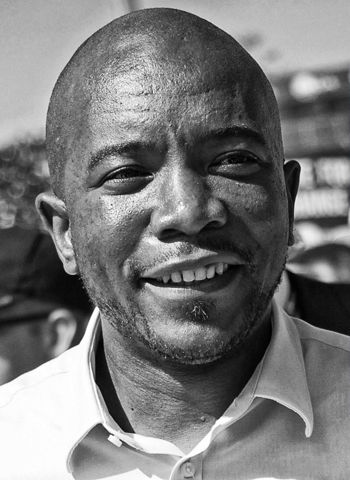South Africa’s trade relationship with the United States is at a precarious crossroads, posing a serious risk to our economy and future growth. While we can debate Washington’s stance toward us, we must also take responsibility for our role in this decline and establish a path to restoring a productive and mutually beneficial trade partnership.
Unfortunately, President Cyril Ramaphosa is not moving fast enough to protect and strengthen this relationship. His inaction has left a void, allowing ad-hoc interest groups and political parties to shape our engagement with Washington in an uncoordinated and potentially damaging manner.
South Africa cannot afford a diplomatic vacuum — especially in a relationship as economically significant as this one.
The African Growth and Opportunity Act (Agoa) is a prime example of what is at stake. Agoa, which grants South African exports duty-free access to the US market, is a critical pillar of our trade strategy.
In 2023 alone, South Africa exported goods worth more than $3-billion to the US under Agoa, supporting industries such as automotive manufacturing, agriculture, and mining. The US is South Africa’s second-largest export market, and any disruption to this access would be a devastating blow to our economy.
https://www.youtube.com/watch?v=gJdf67PwmS8
However, South Africa’s diplomatic choices have sent mixed signals to our largest trade partners. Despite claiming a stance of nonalignment, the government’s engagements with Russia, Iran, and Hamas have raised red flags in Washington.
Further exacerbating tensions is the conduct of former ambassador Ebrahim Rasool, whose rhetoric contributed to a deterioration in relations. Regardless of personal views on the Donald Trump administration, it was a diplomatic blunder of catastrophic proportions for an ambassador to publicly attack and disparage his hosts.
In today’s digital age, every statement is recorded and scrutinised — an experienced diplomat should have understood the consequences of reckless commentary.
We must mend this relationship. President Ramaphosa has repeatedly emphasised South Africa’s historic and strategic ties with the US. We cannot afford to passively accept the current state of affairs or abandon this long-standing partnership.
However, we must also acknowledge that our diplomatic missteps extend beyond mere mismanagement — they have, at times, been deliberate. This pattern has persisted across both the Biden and Trump administrations. Despite claiming a stance of nonalignment in global affairs, South Africa’s actions suggest otherwise.
Hamas
Consider the following examples: In August 2022, then-Defence Minister Thandi Modise attended the Moscow Conference on International Security at the invitation of Russia’s defence minister. More recently, the ANC hosted three senior Hamas representatives in Pretoria, including Khaled Qaddoumi, Hamas’s representative to Iran.
Additionally, in October 2023, Minister Naledi Pandor met with Iranian President Ebrahim Raisi and Foreign Minister Hossein Amir-Abdollahian — despite Iran’s widely known designation by the US as a state sponsor of terrorism. Even ANC Deputy Secretary-General Nomvula Mokonyane publicly boasted about meeting Iran’s ambassador to South Africa.
These diplomatic choices have consequences. They indicate either a reckless disregard for international sensitivities, or a calculated bias that contradicts our claimed neutrality. In stark contrast, South Africa has been meticulous in avoiding any offence to China.
We have exposed the undeniable consequences of foreign policy failures within our region. Our government hypocritically takes partisan stances on global issues while turning a blind eye to human rights violations across Africa, as seen in Zimbabwe, Mozambique, and Malawi.
We have strictly adhered to the One-China policy, even requesting the relocation of Taiwan’s consulate to appease Beijing. This demonstrates that we are capable of diplomatic caution when we choose to exercise it.
This has fuelled uncertainty over Agoa’s future, jeopardising thousands of jobs dependent on our preferential access to the US market. To safeguard our trade relationship, South Africa must adopt a consistent and pragmatic foreign policy that prioritises economic interests.
The United States remains a crucial trading partner, and we need a clear, government-led strategy to protect and expand our trade relationship.
First, President Ramaphosa must ensure South Africa is actively represented in trade negotiations. It is unacceptable that organisations such as AfriForum and Solidarity are securing meetings with US officials while South Africa’s official envoys remain absent.
We must also prevent individual political parties, such as the Democratic Alliance, from engaging with Washington unilaterally. Trade policy should be formulated within the Cabinet and executed through official diplomatic channels.
Second, South Africa must engage directly with the US Congress, which plays a decisive role in trade agreements like Agoa. Our government must consistently lobby lawmakers, demonstrate the tangible benefits of continued trade cooperation, and provide assurances that our foreign policy will not undermine economic ties.
Trade management strategy
Third, we need an effective trade management strategy that prioritises key sectors. The US is South Africa’s largest market for vehicles, with exports exceeding $1.2-billion annually.
Our primary focus must be achieving 5% economic growth by eliminating policies that hinder progress. A key strategy should be increasing gross capital formation, where the United States can play a significant role in driving investment and economic expansion.
Additionally, South Africa exports significant volumes of citrus, wine, and metals to the US. Our government must secure trade agreements that protect these industries while fostering investment in high-growth areas such as technology and green energy.
President Ramaphosa must act swiftly to stabilise and strengthen our trade relationship with the US. This requires appointing a competent ambassador to Washington who can rebuild trust, secure Agoa’s extension, and expand market access for South African goods.
The stakes are too high for inaction — our foreign policy must prioritise economic diplomacy to protect jobs, industries, and future growth. DM
If you wish to comment on this issue, please send an email to letters@dailymaverick.co.za
Letters will be edited.




